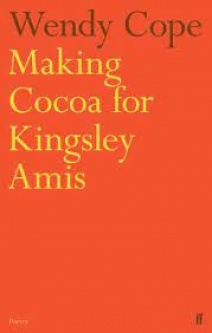My kind of poet: the seriously funny Wendy Cope

I owe an enormous debt to Wendy Cope because she rekindled my interest in poetry without ever realising it. Our paths crossed in 1984 when she handed over to me as reviews editor of Contact, the weekly newspaper for schools staff published by the Inner London Education Authority.
At the time, Wendy was a talented but anonymous primary school teacher who was yet to become a national treasure, a term she probably hates. For two years she had been seconded to the magazine and I succeeded her.
I don’t think I have ever started a job as well briefed and prepared. Wendy was meticulous: all the paperwork, contacts and books were neatly labelled and filed, and she spared much time for chats to advise me about the pitfalls and pleasures of working at County Hall on the South Bank. I have to say she showed me great consideration and kindness.
All those traits that she revealed later in her poetry were plain to see: her wit, her eye for detail, her insecurity (she couldn’t do enough for me) and her generosity of spirit.
I continued to bump into her over the next three years – my secondment was extended a year after changes within the authority – because she regularly popped into the office to go to lunch with Dave Gelly, another journalist on the paper who was jazz critic of the Observer in his spare time, and Robert Gretton, a teacher-reviewer, who had been one of her 'Bloody Men'. Both are mentioned in 'The Orange' from her second collection, Serious Concerns.

But here was Wendy who talked about villanelles and triolets as if she had been casting them all her life (I had to look them up to understand what she was talking about). I knew she had been to Oxford and assumed she did English – it was only later I found out her subject was history. So she consciously drove herself to master the forms and disciplines of poetry.
And how she used it. She didn’t take herself too seriously and gently pulled the rug from under other people’s pretensions:
We make more fuss of ballads than of blueprints –
That’s why so many poets end up rich,
While engineers scrape by in cheerless garrets.
Who needs a bridge or dam? Who needs a ditch?
(Engineers' Corner')
She made observations on life, its absurdities, joys and humour and she was frank and funny about her relationships:
Pick up the phone before it is too late
And dial my number. There’s no time to spare –
Love is already turning into hate
And very soon I’ll start to look elsewhere.
('Message')
And very wise and sensitive:
Yalding. 1912. My father
in an apple orchard, sunlight
Patching his stylish bags …
There he is happy, and I am unborn.
('On Finding An Old Photograph')
I decided I needed to take poetry more seriously, too. I regularly bought collections (all of Wendy’s naturally). Then 10 years ago, I started learning poems, partly out of interest and partly to exercise my brain. Mainly Irish – my father grew up in West Cork – I soon became obsessed with Seamus Heaney who was steeped in a world that was familiar. Two years ago, in retirement, I started a reading group – a choice of poems, short stories or extracts from prose or fiction – and I regularly featured Seamus and Wendy. She went down very well. My latest obsession is a discovery for me – Eavan Boland who died last year and whose canon is a rich treasure trove.
Two years ago, I heard Wendy on Desert Island Discs and was thrilled to hear her talk – unassuming, caring and, like me, she’s a big fan of the actress Nicola Walker. Her choice of music echoed my enthusiasms, too: Thomas Tallis, Mozart, folk music from Robin Hall and Jimmie MacGregor, two pieces by Johann Sebastian Bach, whose Concerto for Two Violins took my breath away.
I deliberately avoid chasing famous people, but writing this has made me realise I should contact Wendy to tell her how much she has enhanced my life.






<Deleted User> (5011)
Wed 19th May 2021 09:35
Thank you for this, Neil. A thoroughly interesting and very enjoyable piece. If Wendy is your kind of poet, you are our kind of reviewer.